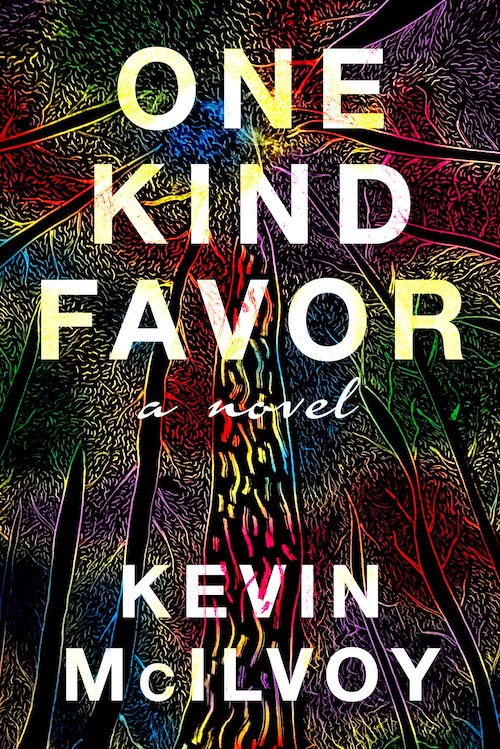
As many philosophers have said, life is full of contradictions. The good is intermingled with the bad, the heavy with the light, the wondrous with the horrific, and order with chaos. Yet literary structure and the sentence itself implicitly invoke only order, at the very least, a temporal order: this chapter leads to the next chapter, this paragraph leads to the next, this sentence to the next. So how do you include the chaos and the illogical? How do you subvert the text, which flows linearly and logically?
Kevin McIlvoy’s novel, One Kind Favor, is loosely based on the 2014 lynching of a young black man in rural North Carolina. McIlvoy places the murder in the small fictional town of Cord, which is populated by humans and ghosts or “Presences.” A first-person plural omniscient narrator, the voice of the town, tells the story. When the lynching is essentially ignored by the authorities, the ghosts, many of whom were victims of the town’s 150-year history of race murders, take over the job of unearthing the truth.
A story like this is usually told in a somber, dirge-like monotone, with few, if any, moments of contradictory joy. But McIlvoy embraces contradiction, and the first-person plural omniscient voice is exuberant, or, in McIlvoy’s words, ludicrous and carnivalesque.
“About 100 pages in to the story, I understood I wasn’t making something that heads in a certain direction, but places the reader in a carnival—all around the reader, things are occurring,” said McIlvoy. “Sometimes they have direction, sometimes they evolve, but each one lands in a dead-end. It’s a different mode from a story that hooks you by plot or theme. With the carnival mode—you are turning and turning to the different dramas, taking them in, dismissing some, taking some in much deeper than you expected.”
The carnivalesque has a long history, forgotten by many, but not McIlvoy whose influences include Angela Carter, Clarice Lispector, Julio Cortázar (especially his novel Hopscotch), Mark Twain, Washington Irving, and Lewis Carroll’s Alice in Wonderland. It’s a literary mode that originated in Mikhail Bakhtin’s Problems of Dostoevsky’s Poetics, and it subverts and liberates the assumptions of the dominant style or atmosphere through humor and chaos.
When the ghosts appeared in the unfolding story, McIlvoy immersed himself in the rich traditions of ghost stories, including Appalachian ghost stories. “I discovered the tradition of the ghost story is carnivalesque,” said McIlvoy. “The ghosts are at play in even the scariest of the stories; their actions inspire wonder-horror and not merely horror.” The coming together of the ghosts, who are not bound by the natural and logical order of things, and the first-person plural voice of the town, opens the door to the carnival ride that is One Kind Favor.
“When you have a narrator like this, by nature you have a narrative that is as often anti-logical as it is logical,” said McIlvoy. “Instead of building, it drifts from one thing to another. In the manner of oral storytelling, it spills out versus pours out. It loses track of where it’s going, as often as it finds where it’s going. That’s the nature of oral storytelling.”

The carnivalesque colors not only the content of the story, but also the sentences, through word play and alliteration, made-up words, and personification. Here are some examples of the playfulness on the page:
Dookian, a dim bulb, dimmed.
Generations of Cord teenagers have been trained in harassing Baracks, which is what the Trumpspawn here calls Black men who don’t know their place.
Stellar wind arabesqued in the vacuum.
Roar! said the small town. Roar! said the small-town crowd. Roar! was the sound, the snarling sound of the small-town crowd in the small town where bedsheet brownshirts felt sorely put down like they felt in all their small crybaby towns all around here. Roar! Roar! said the white-hot hate states and the hot-white neighbor states raging and roaring and rallying around a squeaking, slime-ringed, squirmy orange bath toy that the bawling, wailing crowd took for a gringrinchy savior. And, after all the barking and teeth-baring and slobber-splashing, there was the roaring, the roaring, the deafening roaring, and the crowd of look-alike incelligans whimpered in weltering rage that Merika no longer let it roar.
The paragraphs, too, have an unconventional design. Instead of flowing one to the next, the paragraphs are separated by white space. This graphic distinction signals to the reader that this is a different sort of storytelling, less loyal to efficiency and utility. In addition, instead of paragraphs moving logically and dramatically, they move along lines of sonic shifts and in associative modes. McIlvoy is a decades-long student of the forms of utterance that include voice. How paragraphs sound has high priority in his processes of composing and revising. He calls the paragraphs ‘tonal clusters.’
Cord watches.
The citizens of Cord don’t miss a thing because we are of one conflicted mind, and we are always minding.
The use of white space also simulates silence. McIlvoy, whose mother is Lithuanian and father is Irish, grew up with oral storytelling, and he learned firsthand that the gaps in the story, the long silences, are a vital part of the oral quality. “I had a lot of storytellers in my family, and I remember the long pauses.” McIlvoy gives an example: “‘I believed I was. Oh. I believed – ‘ – long pause, then – ‘I was a good man – most of the time.’”
“I want the page to feel like that: to have space for silence,” says McIlvoy.
This is a book committed to acknowledging the unspeakable. “How do we have such loving hearts—and we truly do here in the American South—and yet have the hate impulse so alive in us that we lynch a young man for the color of his skin? How unworthy all our words are in the face of that horror.”
